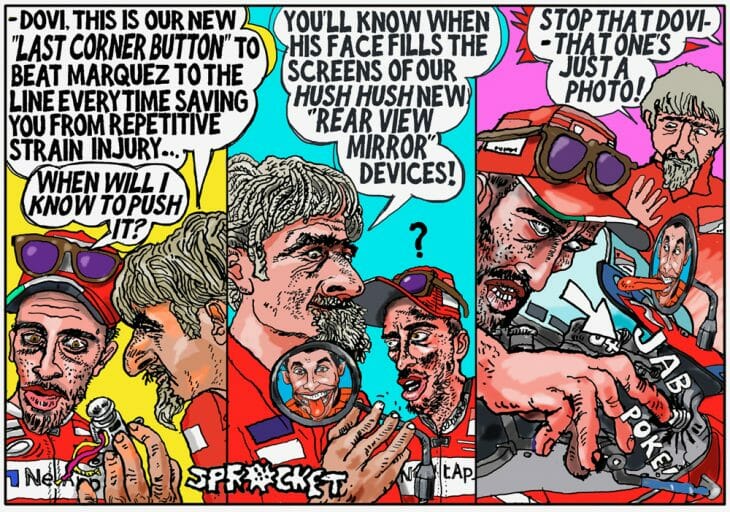Michael Scott | March 27, 2018
In The Paddock | Phony Peace, Real War
COLUMN
So the “MotoGP family” flew to Qatar for a family reunion. Long-separated cousins embraced, reminiscences were shared, bread was broken and gooey bonhomie spilled over the desert sands. What a pleasure when such emotional closeness can be celebrated. What a wonderful affirmation of racing’s innate sweetness.
Oh, yes. There was a motorcycle race as well. You may have seen it.
But there were times when that seemed a minor adjunct to a group love-in and social media feast where saccharine combined with sucrose, glucose with goodwill, and fake smiles were plastered on every face.
These dyspeptic thoughts (forgive me for exaggerating) were triggered at the pre-event press conference, where among others the eventual podium gang—Rossi, Dovi, Marquez—were there to face the grilling of the media. And among the usual crop of essentially anodyne “Who do you think will win” sort of questions, came one that was particularly cringe-worthy, asking Marquez and Dovi just how good it must feel that after a fierce race, they could appear to be such good friends when interviewed. (Quick, let’s have a group hug before we move on.)

Marquez allowed that “after you race to the limit, it is nice if you can talk together.” Dovi was a little more analytical, admitting it was “not always possible, depending on the way people are racing, but it is important for me to have this [good] relation.”
If this artificial sweetener sparked a note of mischief in Rossi, he kept it hidden. I was dying to ask him if he shared the lovey-dovey imperative, looking back over his past relations with Biaggi, Gibernau, Lorenzo et a, but my hands-up waving was studiously ignored (I like to think because I am the black sheep of this imaginary “family”), and I never got another chance.
So I spent most of the weekend glowering angrily, seeking relief by remembering racing times when rivals were rivals, and didn’t mind who knew it.
I first got interested in racing way back when so-called teammates Phil Read and Bill Ivy were openly at each other’s throats, much to their employer Yamaha’s dismay. In the end, Read earned Yamaha’s rejection when he turned his back on internal agreement in 1968, a dominant year for the tuning-fork factory. The plan was for Read to take the 250 title, and Ivy the 125. But Read broke ranks after Ivy had problems, and took both of them.
I laughed along with all other cynics when Barry Sheene wielded his razor wit to belittle his rivals. There were too many examples to count. To get on the wrong side of Barry all you had to do was line up on the same starting grid. Here’s one, aimed at irritatingly fast new Suzuki teammate Pat Hennen, in his weekly column. “If you pay peanuts, you get a monkey.” (“Some monkey,” Sheene’s friend Steve Parrish told me later. “This one had horns.”)
I vividly recall how Lawson and Gardner could hardly bear to be in the same room. Indeed, the ever-independent Lawson wasted little time making even false friends – his repudiation of a proposed riders’ strike in Brazil was both high-minded and spectacular. “Whatever you guys decide, I am going to do the opposite,” he told a fractious riders’ meeting.
And how about, especially in their early AMA championship days, the sizzling enmity between Rainey and Schwantz, each willing to kill the other. Then the open disdain to John Kocinski by pretty much everyone.
Those were the days.
But you don’t have to go too far back to find recent examples, as well as the Rossi cases above. Casey Stoner for instance was never once to mince words or sugar the pill. Who can forget his comment to Rossi after the Ducati-mounted superstar had knocked him off at Jerez. “What happened?” asked Casey. “Did you run out of talent?”
Much more recently, Rossi’s attack on Marquez in Malaysia at the end of 2015. He accused the Spaniard of helping Lorenzo to the title by beating the Spaniard in Australia, taking five points of him. Rossi’s reasoning was inexplicable, but the emotion and aggression entirely understandable and admirably sincere.
Modern racing, however, seems intent on keeping reality at bay. As for Dr. Pangloss, everything is for the best in the best of all possible worlds. And if this doesn’t sit comfortably with the actuality of racing—a truly tough and frequently brutal contest, with every other rider just somebody to beat—that’s too bad.
As I frequently reassure myself, at least they still have a race on Sunday. And what a race, desperately fierce and close, with yet another of Marquez’s frankly almost lunatic last-corner attacks, and yet another win for super-calm Dovi.
And if they chatted happily afterwards for the cameras, only one of them really meant it. CN